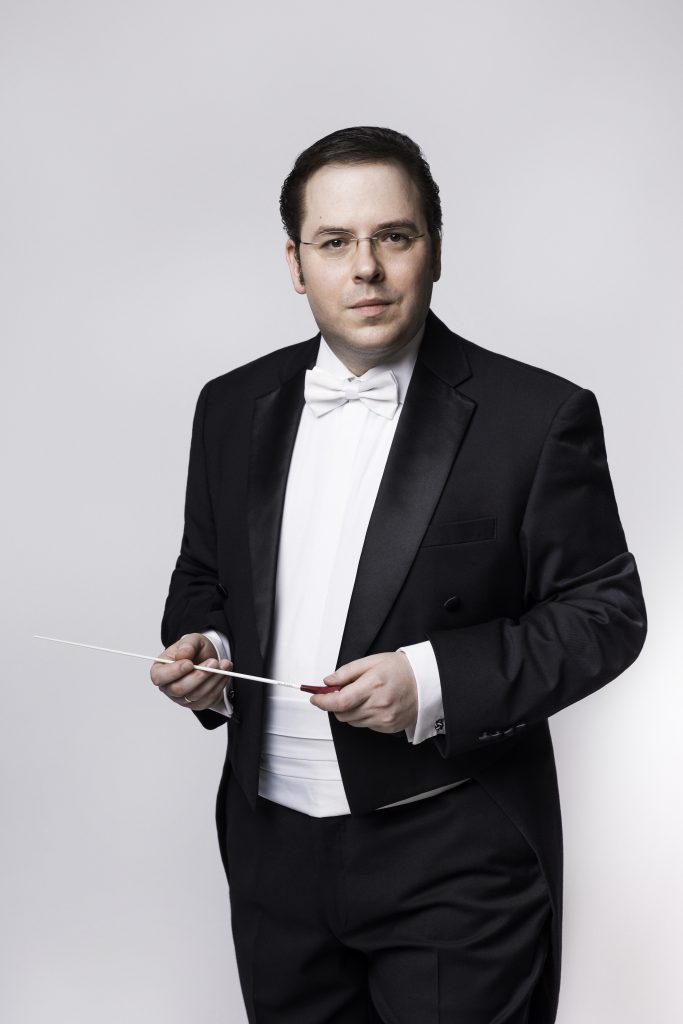by Mike Telin

Whether you know her as Cendrillon, Aschenbrödel, La Cenerentola, La Cenicienta, Soluschka, or, most likely, Cinderella, the story of that downtrodden stepchild is an irresistible fairy tale. It’s been turned into many operas, but perhaps most magically by Jules Massenet.
On Thursday, November 7 at 8:00 pm, Oberlin Opera Theater will present Massenet’s Cendrillon in Hall Auditorium. Stephanie Havey directs and James Feddeck conducts the Oberlin Chamber Orchestra. Performances continue on Friday and Saturday at 8:00 pm and Sunday at 2:00 pm. Tickets are available online.
Feddeck, an Oberlin alum, said that he’s excited to be returning to conduct his first Cendrillon. “I find that the music has so much of the story to tell, which is often the case with opera. But this music is so well written and so carefully constructed that there’s so much meaning behind it.”
What is it about the story of Cinderella that people are so enamored with? Feddeck said, “Of course there’s this kind of fantasy world, the dreamer, and so on. But in this particular telling, you’ve got the father Panddolfe who is such a humanist. He essentially remarried to try to elevate his standing in society along with his daughter. But it didn’t really have full effect because of the personality of his new wife and her interest in her own two daughters. There’s definitely a very relatable element to that idea of sacrifice, which is so humorously told in this production.
The conductor added that Massenet had a wonderful sense of dramatic pacing, and the score is full of detailed instructions. “Markings like subito forte and subito piano — things that at first glance don’t make a lot of sense until you realize the dimension that those markings add to the meaning, and the character development. I think he wanted it to be very clear, and the challenge is observing those things.”
Massenet’s score is also beautifully orchestrated with amazing colors. “Moments like the offstage chorus when the Fairy Godmother comes onto the scene — it’s just gorgeous music.”
Attractive as the music is, Feddeck said the production will include a couple of cuts. “There’s a fair amount of dance music and while it’s a pity that people won’t hear that beautiful music, you’d have to have a real ballet company to pull it off. Having said that, I think that what we’ve come up with holds together and tells the story very well.”

Unlike many opera productions where rehearsal time is often at a premium, what Feddeck has enjoyed about the Oberlin production is having ample time to spend with the singers. “I’ve been able to work with them since mid-September. But in this case, what I really love is that, practically speaking, our role is to develop the opera stars of tomorrow. These are all undergraduate singers and many times I’ve had to remind myself of that because they’re doing so well. They are so talented, so curious, and so receptive to everything, it’s just wonderful.
That enthusiasm is shared by the orchestra, but not immediately. “At first they think, Oh, I don’t know, I like my Tcahikovsky symphonies and my Mahler. But suddenly when you’re in the heat of the battle, opera is such a glorious thing to be part of. There’s a reason that the truly great orchestras in the world are opera orchestras. They have that quickness, that nimbleness, that color, the ability to accompany so delicately and also overpower with sonic beauty, and be all-consuming one moment, and the next be delicate. It’s wonderful. I just can’t wait for this week.”
Although Feddeck has been interested in the opera industry since his student days, his first professional work in the genre came when he was assistant conductor of The Cleveland Orchestra. “We were doing fully staged productions with Zurich Opera every season, and on two hours notice I took over a performance of Don Giovanni when Franz Welser-Möst was ill. That was a personal revelation for me and a turning point in my career. And I feel very fortunate to not only be doing this production at Oberlin, but to have the opportunities that I’ve had.”
In 2020 Feddeck became Principal Conductor of Orchestra i Pomeriggi Musicali in Milan, Italy. “I”ve been conducting a fair bit of opera, and opera in Italy is amazing because it’s such a part of their culture. When we invite young students, I mean middle school students, the questions they ask — it’s just clear they grow up with it.”
Feddeck noted that attending the opera is a family and community affair. “We have everybody, older people, younger people, we have people on dates or celebrating birthdays. We’ve got children, very young children, with their parents and grandparents. And I think that’s another thing that excites me about what I see here at Oberlin. There’s so much enthusiasm about this opera on campus and in the community. It’s an opera for all ages, too, so I hope everybody will come.”
Published on ClevelandClassical.com November 4, 2024
Click here for a printable copy of this article



